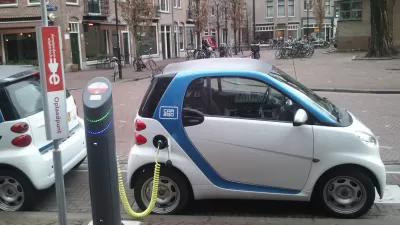Please, don't buy the Fiat 500 E, stated Fiat Chrysler Automobiles CEO Sergio Marchionne during his presentation on a Brookings panel on May 20. It's not because it's a bad car—it's because his company loses $14,000 on every sale.

The loss is not unexpected; it's the amount that is new. It just increased 40% to $14,000, writes Karl Henkel of The Detroit News. Last year we quoted Marchionne when the loss was estimated at $10,000. "Doing that on a large scale would be masochism to the extreme," he said.

Since then, seven other states have joined California in this requirement, according to an Air Resources Board press release last October. Those other states are Connecticut, Maryland, Massachusetts, New York, Oregon, Rhode Island and Vermont.
Can auto companies make money from selling EVs? "Marchionne said Tesla Motors was the only company making money on electric cars and that was because of the higher price point for its Model S sedan," writes Beech.
"Automakers have sold approximately 15,000 (battery-only) electric vehicles (from January) through April, according to the Electric Drive Transportation Association, up about 9 percent compared to the same period in 2013," writes Henkel. The amount doubles when plug-in hybrid-electric vehicles (PHEV) are included, according to InsideEVs (see breakdown of sales of all models).
By comparison, sales of all "automotive purchases will eclipse more than 1.4 million motor vehicles through the 30 days of April," according to Precise Leads.
Marchionne's real message to the Brooking's audience was not so much not to buy his electric car, but toward costly federal mandates. "(H)e would prefer the U.S. Department of Energy simply set targets and let the automakers achieve them in their own way," writes Beech.
Otherwise, he warns, "we'll be back asking ... in Washington for a second bailout because we'll be bankrupt."
FULL STORY: Marchionne: Fiat loses $14K on every electric 500

Manufactured Crisis: Losing the Nation’s Largest Source of Unsubsidized Affordable Housing
Manufactured housing communities have long been an affordable housing option for millions of people living in the U.S., but that affordability is disappearing rapidly. How did we get here?

Americans May Be Stuck — But Why?
Americans are moving a lot less than they once did, and that is a problem. While Yoni Applebaum, in his highly-publicized article Stuck, gets the reasons badly wrong, it's still important to ask: why are we moving so much less than before?

Using Old Oil and Gas Wells for Green Energy Storage
Penn State researchers have found that repurposing abandoned oil and gas wells for geothermal-assisted compressed-air energy storage can boost efficiency, reduce environmental risks, and support clean energy and job transitions.

Minneapolis Bans Rent-Setting Software
Four cities have enacted restrictions on algorithmic software that can inflate rent costs.

Oakland to Add 244 New EV Chargers
Oakland plans to launch its new charging network at eight locations by the end of 2025.

Jane Goodall Inspires with Message of Hope, Resilience, and Environmental Action
Speaking in Pasadena, Jane Goodall offered a hopeful and inspirational message, urging global compassion, environmental responsibility, and the power of individual action to shape a better future.
Urban Design for Planners 1: Software Tools
This six-course series explores essential urban design concepts using open source software and equips planners with the tools they need to participate fully in the urban design process.
Planning for Universal Design
Learn the tools for implementing Universal Design in planning regulations.
Heyer Gruel & Associates PA
City of Moreno Valley
Institute for Housing and Urban Development Studies (IHS)
City of Grandview
Harvard GSD Executive Education
Salt Lake City
NYU Wagner Graduate School of Public Service
City of Cambridge, Maryland


























